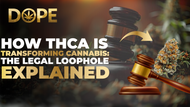How THCA Is Changing the Cannabis Landscape?
Posted by DOPE on Oct 28th 2024
In recent years, THCA (Tetrahydrocannabinolic Acid) has emerged as a fascinating cannabinoid within the cannabis industry. While THCA and its cousin THC (Tetrahydrocannabinol) share similar names, they are vastly different in terms of their effects and potential benefits. As the cannabis industry continues to evolve, THCA is becoming more popular for its unique properties, particularly its non-psychoactive effects and potential therapeutic applications.
In this blog, we'll explore how THCA is revolutionizing the cannabis landscape, its benefits, and how it's paving the way for the future of cannabis consumption.
What is THCA?
THCA is the precursor to THC, the psychoactive compound that is most commonly associated with cannabis use. When cannabis is harvested, the plant contains THCA in its raw form. Through a process called decarboxylation (usually by heating), THCA converts into THC, which is responsible for the euphoric high many users experience.
However, THCA itself is non-psychoactive, meaning it doesn’t produce the “high” typically associated with cannabis. This makes THCA an appealing option for those looking to explore the therapeutic benefits of cannabis without the psychoactive effects.
The Rise of THCA in the Cannabis Market
As the cannabis market expands and consumer preferences shift, there has been a growing interest in non-psychoactive cannabinoids like THCA. This trend is driven by the increasing demand for cannabis products that provide medicinal benefits without the intoxicating effects of THC.
Consumers seeking relief from conditions such as pain, inflammation, and anxiety are turning to THCA-rich products, which are becoming more widely available in various forms, including THCA tinctures, THCA concentrates, and even raw cannabis flower. As more people learn about the benefits of THCA, it is expected that its role in the cannabis market will continue to grow.
How THCA Is Changing the Cannabis Landscape
-
Non-Psychoactive Benefits
One of the primary reasons THCA is gaining popularity is because it provides the potential benefits of cannabis without the psychoactive effects of THC. People who may be sensitive to the intoxicating effects of THC can still experience THCA's therapeutic properties. This has opened up cannabis use to a wider audience, including those who previously avoided cannabis due to its mind-altering effects.
For example, THCA has been found to have anti-inflammatory and neuroprotective properties, making it a promising option for individuals dealing with chronic pain, neurodegenerative diseases, and conditions like arthritis. Its ability to provide relief without impairing cognitive function makes it a valuable addition to the cannabis landscape.
-
Exploring New Therapeutic Uses
The potential therapeutic uses of THCA are still being researched, but early studies show promise in areas like cancer treatment, pain management, and appetite stimulation. Unlike THC, which can cause increased hunger, THCA might have appetite-suppressing properties, offering a more balanced approach to weight management for those who struggle with overeating.
Moreover, THCA is also being investigated for its potential neuroprotective effects. Some studies suggest that THCA may help in protecting brain cells from oxidative stress and may even have a role in preventing diseases like Alzheimer's and Parkinson's.
-
The Popularity of THCA Flower
The growing demand for THCA-rich cannabis products has led to a surge in the popularity of raw cannabis flower. Consumers can now purchase flower that is high in THCA without worrying about the psychoactive effects of THC. These raw flowers, often marketed as “live cannabis”, provide all the benefits of the cannabis plant while preserving the natural form of THCA.
Many dispensaries now offer a variety of THCA flower strains, allowing consumers to choose based on their preferences and desired effects. This new form of consumption appeals to those who want to experience the full spectrum of cannabis benefits without the "high" that usually accompanies THC-rich products.
-
THCA vs. THC: The Therapeutic Debate
As the cannabis industry continues to evolve, the debate between THCA vs. THC is becoming increasingly important. While THC remains the most well-known cannabinoid, THCA is emerging as a valuable alternative for those seeking medicinal benefits without the mind-altering effects of THC. As research into THCA's therapeutic potential expands, it’s likely that both cannabinoids will coexist in the market, each serving different needs and preferences.
For medical cannabis patients, having access to a non-psychoactive cannabinoid like THCA opens up new possibilities for treatment options. Whether used alone or in combination with THC, THCA offers a versatile range of benefits that could help address various health concerns.
How to Consume THCA
Consumers interested in THCA can now find a variety of products designed to provide its therapeutic effects. Some popular methods of consumption include:
-
THCA tinctures: A convenient way to take THCA, allowing for precise dosage and easy administration.
-
THCA concentrates: Extracts that offer a potent dose of THCA for those seeking stronger effects.
-
Raw cannabis flower: For those who prefer smoking or vaping, THCA-rich flower is available at many dispensaries.
-
THCA capsules: A discreet and easy way to consume THCA without the need for inhalation.
When consuming THCA, it's essential to understand the dosing and method of consumption that works best for you. Since THCA is non-psychoactive, it can often be used more freely without concerns about intoxication.
Conclusion: The Future of THCA in the Cannabis Industry
As more people turn to cannabis for its health benefits, THCA is playing a key role in shaping the future of the cannabis industry. With its non-psychoactive effects and potential therapeutic applications, THCA is revolutionizing the way consumers think about cannabis. Whether it's for pain relief, anti-inflammatory benefits, or neuroprotection, THCA is carving out a niche in the ever-expanding cannabis landscape.
With ongoing research into its medicinal properties, THCA is poised to become a cornerstone of the cannabis market, offering a natural, effective solution for those seeking the therapeutic benefits of cannabis without the intoxicating effects of THC.

